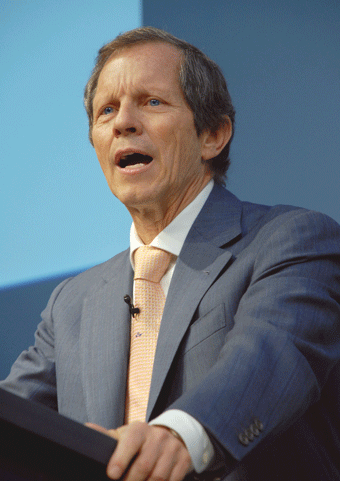IATA Takes The Gloves Off
 It
was a hard-hitting Giovanni Bisignani at his fighting best. It
was a hard-hitting Giovanni Bisignani at his fighting best.
Addressing the Confederation of Indian Industry
(CII) and the Asia Pacific Aviation Media Association, the Director General
and CEO of the International Air Transport Association (IATA), yesterday
(September 24) minced no words to lambast the Indian government in general
and the civil aviation ministry in particular.
"The coming months are critical. The
industry is sick. I had to suspend over 25 airlines from our settlement
systems because they went bust," he said. His words only echoed what
many industry pundits have been saying that domestic carriers in India
have been bleeding financially as a result of the high prices of aviation
turbine fuel in the country. The IATA has, in fact, compiled a list of
20 airlines which could go bust in the near future but officials in Bisignani's
office refused to comment on whether there were any from India on the
top-20 list.
The lack of infrastructure and high fuel
prices—largely due to high rate of taxation in India—raised
Bisignani's ire and he showed his unhappiness.
"On my last visit I made it clear
in my presentation that India's aviation dream -- built on market liberalisation
and new aircraft orders --- could become a nightmare. Certain issues needed
to be handled correctly: improving infrastructure, matching capacity growth
to demand, harmonising to international standards and building a competitive
cost structure," he said and quickly took it up from there with,
"None of this has happened, and today the situation is critical.
India's airlines expanded quickly taking advantage of new opportunities.
But targeting market share put the bottom-line at risk.
"Rising food and energy costs are
eating into disposable income. So cutting fares to fill seats is not working…"
He pointed out that the growth in the industry
had slowed from 33 percent in 2007 to 7.5 percent in the first half of
this year and had gone negative in the last two months. "The global
crisis is hitting India hard. While the established airlines are working
to match capacity to demand, some start-up airlines continue to expand
rapidly," he said.
As a result, Bisignani said, "The
bottom line is bleeding. India will post the largest losses outside the
U.S. -- potentially US$1.5 billion this year. Airlines are starting to
take some tough medicine. Domestic capacity growth will stop by the end
of the year. Aircraft orders are being deferred and we have seen some
consolidation. Among the consolidations, the historic merging of Air India
and Indian Airlines was the biggest and most important. Now, effective
implementation to achieve efficiencies is the challenge."
Taking up the issue of the high fuel prices,
the IATA chief said that fuel was the biggest factor impacting profitability.
"While fuel is 36 percent of average industry costs, it is up to
50 percent for some Indian carriers. India is among the most expensive
places on the planet to buy aviation turbine fuel. In August a kilo-litre
of ATF cost Rs 73,600 in Mumbai. In Singapore it was Rs 46,500 rupees.
That 58 percent differential is robbing Indian airlines of their competitiveness."
He then went on to advise what the Indian
government could do: "Two additional important domestic tax measures
must be taken -- removing excise taxes and implementing a 4 per cent standard
state tax for domestic fuel in line with Ministry of Civil Aviation recommendations.
We must also look at greater transparency in ATF base pricing and common-use
fuel facilities. Achieving all of this, will give India's aviation industry
a much more solid competitive footing."
Referring to the government's decision
to establish a committee to look into the problems facing the aviation
industry, Bisignani said,
"My biggest concern is speed. This
is a fast changing industry and India's decision-making is too slow. The
crisis highlights this."
Having dealt with the fuel prices, the IATA boss went on to pick holes
in the aviation infrastructure in the country. "Delhi is improving.
A new runway (the third one reported in detail by Air Cargo News FlyingTypers)
will soon provide extra capacity as will the new terminal in 2010. Greenfield
projects like Bangalore and Hyderabad are helping, as are upgrades in
Chennai, Kolkata and others. But these are not complete solutions. They
will soon be at capacity. Long-term solutions that think much bigger are
required."
He then took up the case of Mumbai where
he said the situation was critical. "Today its terminal handles 24
million passengers a year. That is twice what it was designed for…The
Greenfield site under consideration with a phase one capacity of 10 million
might provide relief, but it is not a serious solution. We need an airport
that can adequately serve the financial capital of the world's second
most populous nation. That means thinking much, much bigger. We must use
the breathing space of the current downturn to engage the airlines and
plan in the 100 million range like Delhi…"
To his listeners, who were just about recovering
from the serial blasts that occurred in Delhi a few days ago, Bisignani
pointed out that India had taken a major diversion from global standards
as far as security was concerned.
"I was very disappointed to see the
Indian Government mandate non-standard data transmission requirements
for Advance Passenger Information (API). Airlines have spent millions
to adapt their systems to UN-EDIFACT. This system is used by every other
country with API programmes. India's go-it-alone decision is an added
cost burden for an industry that cannot afford it. India's unique standard
provides no additional security benefit. And it limits the ability of
the government to share information with other jurisdictions. This is
a serious flaw for India's APIS at a time when increased cooperation is
needed. This must change," he said.
Praising Civil Aviation Minister Praful
Patel for pushing the aviation industry forward, Bisignani said, "Minister
Patel's liberalisation of India's domestic and international markets created
tremendous new opportunities although pressure on the infrastructure still
demands urgent solutions. And the expansion of airlines led to a process
of consolidation building stronger carriers. But we must not lose sight
of one important fact: aviation is making India a better place by connecting
business to global markets, expanding tourism and creating jobs…Now
we must look beyond India's borders. The 60 year-old bilateral system
must change so that the airlines that facilitated the global village can
enjoy its benefits. Almost every other industry can sell its products
where markets exist, start businesses across borders or merge and consolidate
where it makes business sense. But airlines need an international treaty
to start services and cross border consolidation risks traffic rights."
Calling himself an India optimist, Bisignani
emphasized, "India is not just a great potential market. This great
country has a natural leadership role to play. But it can only achieve
this by addressing the issues of today's crisis with quick decisions based
on global standards…Europe and America are our industry's history.
Asia is our future."
Jet Airways' CEO Wolfgang Prock Schauer,
standing in for his boss, Naresh Goyal who was supposed to attend the
interactive session with the IATA chief, welcomed Bisignani. Prock Schauer
said that "today's crisis is far more severe that 9/11 and we need
to be careful to tackle it."
Ankur Bhatia, Past Chairman, CII Delhi
State Council, in his concluding remarks thanked Giovanni Bisignani for
bringing clarity to the problems facing the aviation industry and hoped
that the government would take necessary action.
Tirthankar Ghosh
Quote
Of The Week
  It’s
like Murder on the Orient Express,” said Jack Welsh former
CEO of The General Electric Company describing the USA financial
crises. It’s
like Murder on the Orient Express,” said Jack Welsh former
CEO of The General Electric Company describing the USA financial
crises.
“There is a killer in every seat,” Black
Jack added.

|
Clouded DG
Regulations Since 911
 If
you ask Patrick N. Oppenheimer Senior Manager Dangerous Goods & Safety
at FedEx Express “why does FedEx offer a dangerous goods service?”
his answer will be as direct as the session he chaired earlier this year
at the IATA World Cargo Symposium in Rome, Italy March 5, 2008. If
you ask Patrick N. Oppenheimer Senior Manager Dangerous Goods & Safety
at FedEx Express “why does FedEx offer a dangerous goods service?”
his answer will be as direct as the session he chaired earlier this year
at the IATA World Cargo Symposium in Rome, Italy March 5, 2008.
In the seven years since September 11, 2001,
regulators have layered onto existing DG issues a wave of regulation —like
never seen before.
Included are a “variety of political
and various organizational pressures and posturing that have further clouded
a difficult issue.
Although FedEx Express daily DG volume is
less than 1/3 of 1% of overall daily package business, the company is
widely recognized worldwide as leader and innovator in DG technologies.
“When prepared/handled correctly and
safely, DG poses no more risk than any other package being transported,
that is why we provide the full value and range of services to our customers.
“Certain industries/industry segments
are highly dependant on the service (no/few alternatives)
“Offering an effective DG service
also meets medical, health, community needs.
“In most cases the public at large
in fact is not necessarily aware of its need and dependence for DG transportation.
“Also by offering a well planned comprehensive
DG service air cargo discourages “underground/undeclared”
shipments.
“Awareness is important —if
fear is the intent of terrorism, then knowledge is the defense.
“Air cargo should communicate facts
without communicating fear.
“To balance the needs of commerce,
business operations and security and safety, we need to use technologies
that aren’t available yet or are still in concept phase.
“But utilizing simple administrative
actions will carry the day while technology catches up.
“Air cargo should pursue and support
government research, development and sound science.
“But at the same time everyone should
carefully review existing requirements, laws and regulations before layering
on more.”
Geoffrey
.gif)
Best
Of Summer 2008

As the days dwindle
down to a precious few, we entered the Autumnal Equinox here in
USA last Monday September 22, and thoughts drift back to the all
too rapid manner in which Summer 2008 flew past.
Our favorite this year was Afrika
2008 in Darmstadt put up by Lufthansa Charter.
Here is the video in case you missed
it.
Geoffrey |
|



